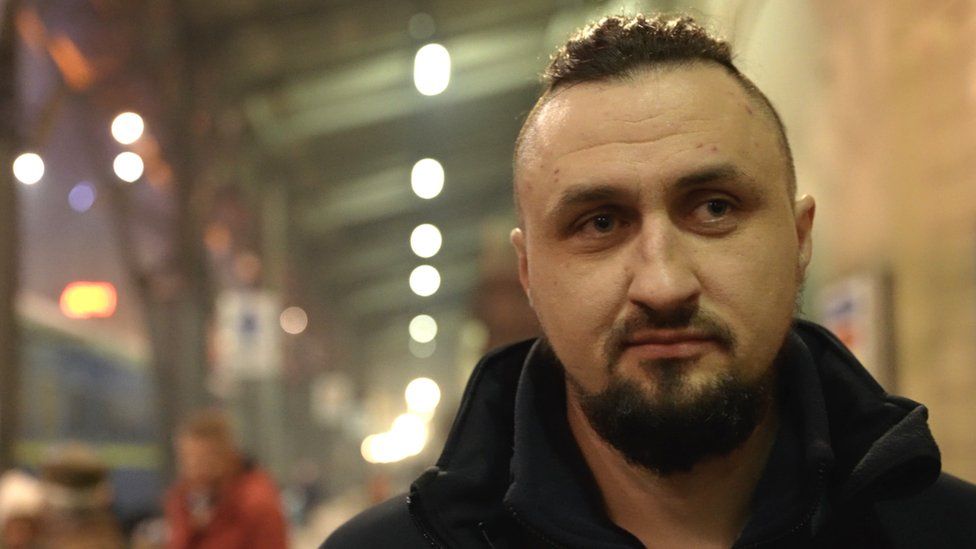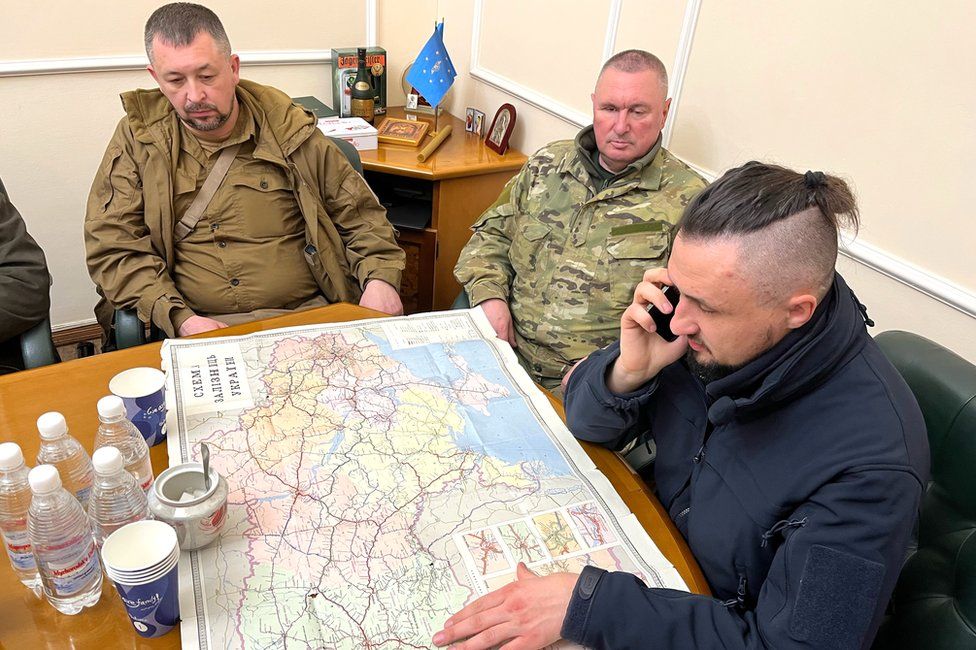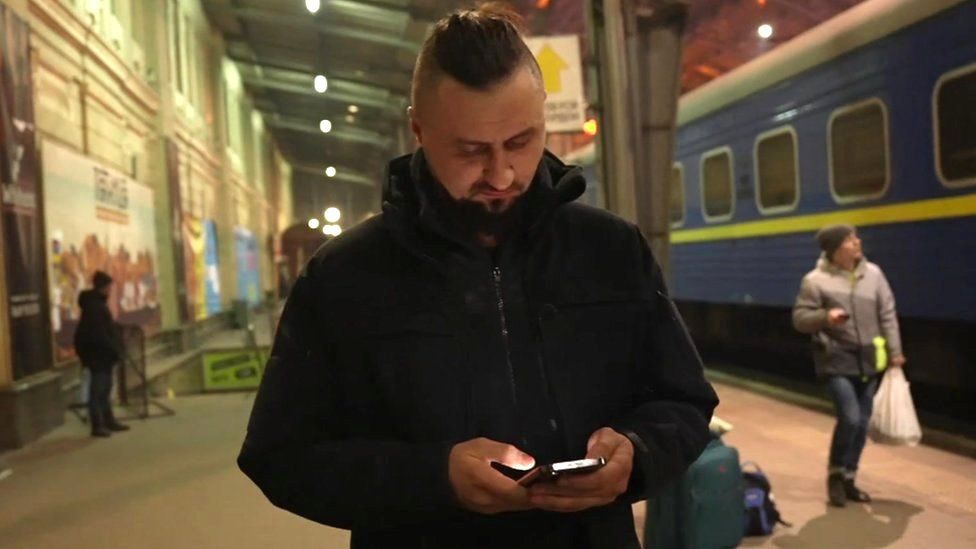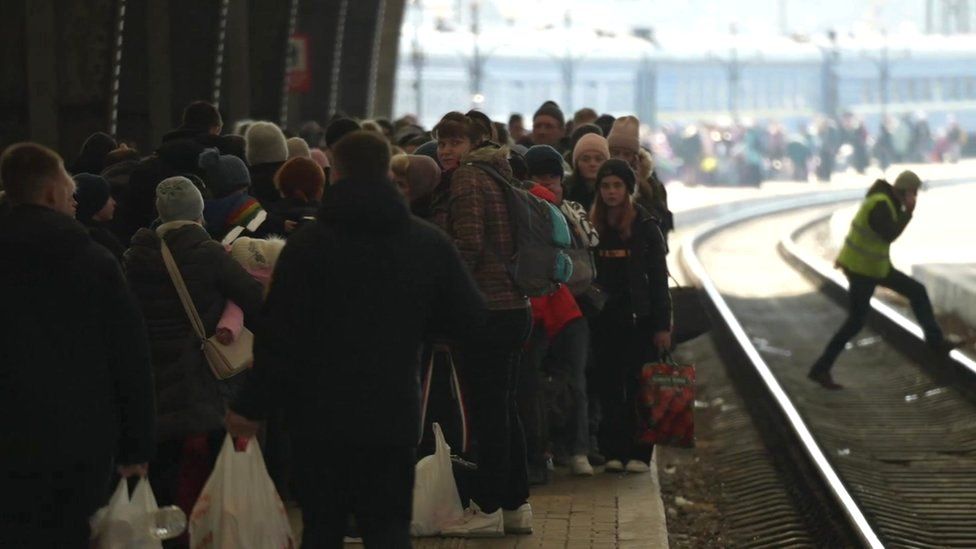Ukraine's wartime rail chief has to be faster than the Russians tracking him
 Image source, Jack Garland/BBC
Image source, Jack Garland/BBCThere is a last-minute change of plan. He won't be leaving from the main station after all. The bodyguards move fast and we follow, racing along the quiet streets behind the convoy, and into the suburbs.
The Russians would like to kill him.
Oleksandr Kamyshin is sure of this. So the 37-year-old chairman of Ukraine's railway network constantly changes his travel plans. Never stay in one place too long. Never have a routine that the Russians can discover.
"We have to be faster than those people who try to track us," he tells me.
The railway is the country's biggest employer with 231,000 staff across 233,000 square miles (603,470 sq km) of territory - Ukraine is the second-largest country in Europe.
So far Mr Kamyshin estimates his staff have helped to move 2.5 million people to safety. But the vast operation has come at a cost. Schedules have to be constantly updated because of Russian attacks. Since Vladimir Putin's invasion began, 33 railway staff have been killed.
"They hit our track daily. They hit the stations. Our people risk their lives. They go under shelling. They keep saving people," says Mr Kamyshin.
When we first meet, he is sitting at a long table with his close advisors, studying a map of the national rail network. Police guard the entrance to the room.

There are constant phone calls. "Thank you for your support. But I also have a request," he says to one caller. "Please help us build trade between Ukraine and Poland." He hangs up and smiles. "That was the Polish minister for infrastructure," he says.
Mr Kamyshin wants to set up a joint venture with Poland to send Ukrainian exports west.
A former accountant and businessman, Mr Kamyshin is now one of the most important men in the country. In a few weeks he has gone from reforming the rail sector to a wartime director of operations.
"All people in Ukraine were businesspeople, farmers and all other professions before the war started. Now all people in Ukraine are at war. All of us have started doing war," he says.
His own life is a blur of rail journeys, stopping at one place to talk to local staff, at another to meet government officials, and constantly in contact with the senior leadership in Kyiv.

He hasn't seen his wife and two young sons since the war started nearly three weeks ago.
Not only do the railways keep refugees moving, they also deliver tonnes of aid to the embattled areas of the country, transport troops to frontline cities, and continue to export whatever Ukraine can produce in these wartime conditions. A Russian blockade has closed the key ports in the south.
Mr Kamyshin comes across as a man who is planning for a long campaign. "Instead of seaports we go west," he explains. "We have launched a programme to relocate production from east to west. So we can move people, ideas, plans, maybe machinery to launch new production in the west."
It is an ambitious project and could be essential to the country's economic survival. However, Mr Kamyshin believes the West needs to do more than supply weapons and humanitarian aid.

He wants the Nato military alliance to enforce a no-fly zone. It is a mantra repeated by government officials at nearly every opportunity - however unlikely the prospect of it happening.
"This war will be won by Ukraine anyway. Now the only thing that needs to happen is the closing of the sky by the West."
My last sight of Mr Kamyshin is close to midnight at a suburban rail depot. He is walking along the side of the tracks in darkness until the spotlight of the approaching train briefly illuminates his small group.
The train pulls alongside and a stewardess welcomes him on board. I cannot say where his train is heading, but the night ahead will be filled with calls and discussions. There will be a few hours of sleep, perhaps, and constant checking of where the Russians have recently attacked.
"We will keep repairing the tracks once the firing stops," he says before leaving. "We will keep the trains running as long as we can. There is no other option for us."



No comments